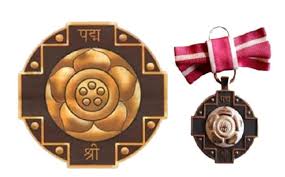
Nityacharya Jatin Goswami, Geeta Upadhyaya, and Rewakanth Mahanta Receive Prestigious Padma Awards

 :
| Updated On: 28-May-2025 @ 4:26 pm
:
| Updated On: 28-May-2025 @ 4:26 pmSHARE
In a distinguished civil investiture ceremony held at Rashtrapati Bhavan, President of India, Smt. Droupadi Murmu, conferred the Padma Bhushan on Nityacharya Jatin Goswami, and the Padma Shri awards on Shri Rewakanth Mahanta and Smt. Geeta Upadhyaya, recognizing their outstanding contributions to art, literature, and education.
Jatin Goswami – Padma Bhushan Recipient
Nityacharya Jatin Goswami, a veteran exponent of the classical Sattriya dance form, was honoured with the Padma Bhushan, India’s third-highest civilian award. Born on August 2, 1933, Goswami’s lifelong dedication to preserving, developing, and popularizing Sattriya dance has earned him immense respect. His initial training came under his father’s guidance, and later he refined his skills under eminent mentors like Maniram Dutta Muktiar and Rosheswar Saikia Barbayan. Additionally, Goswami trained under Kalaguru Bishnu Prasad Rabha, mastering folk music, dance, and Ankiya Nat, a traditional Assamese one-act play form.
Goswami has been a pioneer in reviving and modernising Ankiya Nat performances, integrating tradition with contemporary presentations. He founded mobile cultural troupes and the Pragjyoti Kala Parishad, which actively toured Satras (monasteries) and Namghars (prayer halls) across Assam, spreading awareness and appreciation of Sattriya culture. Beyond performance, Goswami has served on prestigious bodies such as the Sangeet Natak Akademi and the Indian Council for Cultural Relations (ICCR). His illustrious career has been marked by multiple accolades, including the Padma Shri in 2008, the Sangeet Natak Akademi Award in 2004, the Kalidas Samman in 2017, and the Akademi Ratna Fellowship in 2019.
Rewakanth Mahanta – Padma Shri Awardee
Rewakanth Mahanta, the Satradhikar (head) of Khatpara Satra in Sivasagar, was honoured with the Padma Shri for his exceptional skills in mask-making and Mukha Bhaona—a distinctive masked dance-drama that forms an integral part of the Sattriya tradition. Born on April 19, 1935, Mahanta inherited the intricate art of mask-making from his father and has since elevated it to international acclaim. His exquisite masks are exhibited in museums across India, Russia, Japan, Australia, and the United States, symbolizing a rich cultural heritage.
Mahanta’s contributions have been recognized by numerous institutions, having received the Sangeet Natak Akademi Award in 2015 and the Bishnu Rabha State Award in 2019. Over 100 organizations have honoured him for his lifelong dedication to preserving this unique art form, which is essential to maintaining the cultural and spiritual ethos of Assam’s Satriya tradition.
Geeta Upadhyaya – Padma Shri Recipient
Geeta Upadhyaya, a prominent writer, translator, and educator, received the Padma Shri for her outstanding contributions to literature and education. Born on February 14, 1939, she was the first woman from Assam’s Gorkha community to earn a postgraduate degree. Upadhyaya dedicated over three decades as a professor and later as the Head of the Department of Political Science at Sibsagar College.
Her literary achievements include receiving the prestigious Sahitya Akademi Award. Notable works authored by her are Janmabhumi Mero Swadesh and the biography of freedom fighter Chabilal Upadhyaya. She is also acclaimed for her translations, including The Diary of Anne Frank and the Ramayana into Assamese, as well as translating several Assamese literary works into Nepali. These translations have played a crucial role in fostering cultural understanding and bridging communities.
Apart from her literary pursuits, Upadhyaya has actively engaged in social causes. She holds memberships in academic boards and juvenile justice bodies, contributing to educational policy and social welfare.